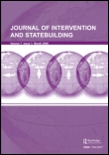
Journal of Intervention and Statebuilding
Scope & Guideline
Bridging Theory and Practice in Global Governance
Introduction
Aims and Scopes
- Intervention Analysis:
The journal critically examines various forms of intervention, including military, humanitarian, and diplomatic efforts, assessing their effectiveness and implications for local populations. - Statebuilding Dynamics:
Research in this area explores the processes and challenges of statebuilding in post-conflict contexts, including the roles of local actors, international organizations, and the impact of global politics. - Peace Processes and Negotiations:
The journal investigates the intricacies of peace negotiations, including inclusivity, representation, and the role of civil society, with a focus on how these factors influence the success of peace agreements. - Gender and Inclusivity:
A significant emphasis is placed on gender dynamics in peacebuilding and security, exploring the intersection of gender with issues of power, representation, and social justice. - Local Knowledge and Practices:
The journal highlights the importance of local knowledge and practices in shaping effective intervention strategies and statebuilding efforts, promoting a local turn in peace studies. - Transitional Justice:
Research on transitional justice mechanisms, including truth commissions and reparations, is a core area of focus, particularly in how these mechanisms address past grievances and foster societal healing.
Trending and Emerging
- Intersectionality in Peacebuilding:
There is a growing focus on intersectional approaches that examine how various identities (gender, ethnicity, class) interact to shape experiences of conflict and peace, highlighting the complexity of social dynamics in post-conflict settings. - Decolonial Perspectives:
Emerging scholarship increasingly critiques traditional Western-centric models of statebuilding and intervention, advocating for decolonial approaches that prioritize local knowledge and practices. - Climate Change and Conflict:
The interplay between climate change and conflict is gaining traction, with research exploring how environmental factors influence conflict dynamics and statebuilding processes. - Digital Peacebuilding:
The role of digital technologies in peacebuilding efforts is a trending theme, with investigations into how social media, online activism, and digital communication can facilitate or hinder peace processes. - Youth Engagement in Peace Processes:
There is an increasing emphasis on the role of youth in peacebuilding initiatives, recognizing their potential as agents of change and the unique challenges they face in conflict-affected contexts.
Declining or Waning
- Traditional Security Approaches:
There appears to be a decline in articles focusing solely on traditional military-centric security approaches, as the discourse shifts towards more comprehensive, multidisciplinary frameworks that include social, economic, and cultural dimensions. - State Sovereignty and Interventionism:
The discussions surrounding state sovereignty in the context of international intervention have become less frequent, possibly reflecting a growing recognition of the complexities and nuances of sovereignty in practice. - Monolithic Narratives of Peacebuilding:
The journal has seen a reduction in papers advocating for monolithic or one-size-fits-all peacebuilding strategies, as there is a clear trend toward more nuanced, context-specific approaches.
Similar Journals
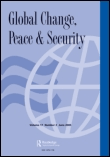
Global Change Peace & Security
Navigating the Challenges of Change for Lasting PeaceGlobal Change Peace & Security is a prominent scholarly journal published by Routledge Journals, Taylor & Francis Ltd, focusing on the intricate interplay between global change and peace efforts within the realms of political science and international relations. With an ISSN of 1478-1158 and an E-ISSN of 1478-1166, this esteemed journal spans from 2008 to 2024, consistently contributing to critical discourse in its field. Ranked in the second quartile (Q2) for both Political Science and International Relations as well as Sociology, it occupies a distinguished position with a Scopus ranking of 134 out of 706 and a percentile standing of 81st in Political Science. The journal’s objective is to bridge the gap between theoretical frameworks and functional policy discussions, thereby fostering dialogue that addresses contemporary challenges in global governance and human security. By offering rich, research-based insights and analysis, Global Change Peace & Security serves as a vital resource for academics, practitioners, and policy-makers committed to advancing peace and security amidst pervasive global transformations.
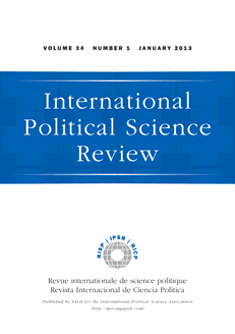
INTERNATIONAL POLITICAL SCIENCE REVIEW
Connecting Scholars and Practitioners in Political Science DiscourseINTERNATIONAL POLITICAL SCIENCE REVIEW is a leading journal in the fields of Political Science and International Relations, published by SAGE PUBLICATIONS LTD. With a rich history dating back to 1980 and converging its expertise up to 2024, this esteemed publication holds a notable position in academia, evidenced by its impressive Q1 quartile rankings in both Political Science and Sociology categories for 2023. The journal’s Scopus rankings further enhance its reputation, proudly sitting in the top percentiles in its respective fields, which underscores its influence and importance for both researchers and practitioners. With a commitment to publishing rigorous research and comprehensive analyses, INTERNATIONAL POLITICAL SCIENCE REVIEW serves as a vital resource for those seeking to engage with the latest debates and developments in political science. Readers are encouraged to explore insightful articles and contribute to the discourse shaping our understanding of global political dynamics.
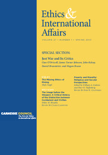
Ethics & International Affairs
Bridging Philosophy and Global Policy for a Better TomorrowEthics & International Affairs is a leading peer-reviewed journal published by Cambridge University Press, offering critical insights at the intersection of ethics, philosophy, and international relations. Established in 1987 and reflecting a robust commitment to interdisciplinary scholarship, the journal aims to foster dialogue on pressing ethical issues in global affairs, addressing topics from military intervention to humanitarian aid. With an impressive Scopus ranking that places it in the 85th percentile for Philosophy and the 64th percentile for Political Science and International Relations, Ethics & International Affairs has established itself as a cornerstone publication within academic circles. Although the journal is not Open Access, it remains accessible through academic institutions and libraries. The journal provides a platform for researchers, professionals, and students alike to contribute to and engage with the evolving discourse on ethical challenges in international contexts, making it an essential resource for anyone looking to deepen their understanding of the moral dimensions of global politics.

LATIN AMERICAN POLITICS AND SOCIETY
Exploring the Dynamics of Latin American GovernanceLatin American Politics and Society, published by Cambridge University Press, is a leading academic journal dedicated to the interdisciplinary study of political and social dynamics in Latin America. With an impressive impact factor and distinguished rankings in several categories—specifically Q1 in Geography, Planning and Development; Political Science and International Relations; and Sociology and Political Science—this journal serves as a crucial resource for scholars and practitioners in these fields. With ISSN 1531-426X and E-ISSN 1548-2456, it provides a platform for innovative research that reflects the complexity of Latin American societies. This journal not only fosters scholarly discourse but also ensures broad accessibility through its open access options, making cutting-edge research available to a wider audience. Engaging with topics from governance, policy analysis, and community studies to social movements, Latin American Politics and Society is essential for those seeking to understand the socio-political landscape of this pivotal region from 2001 to 2024 and beyond.
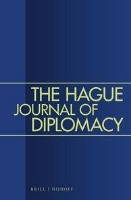
Hague Journal of Diplomacy
Illuminating the complexities of international negotiations.The Hague Journal of Diplomacy, published by BRILL, is a leading scholarly journal that has significantly contributed to the fields of Political Science and International Relations since its inception in 2007. With an ISSN of 1871-1901 and E-ISSN 1871-191X, this journal has rapidly established itself as a Q2-ranked publication in its category, currently positioned at rank #150 out of 706 in Scopus, placing it in the 78th percentile. This places The Hague Journal as a critical resource for researchers, practitioners, and students interested in contemporary diplomatic practices, international negotiations, and global governance dynamics. As it continues to publish innovative and thought-provoking articles leading up to 2024, this journal not only fosters academic discourse but also serves as a vital platform for disseminating research findings and best practices in diplomacy. While the journal does not operate under an open-access model, its impact on the scholarly community and its role in advancing understanding in diplomacy cannot be overstated. The journal is based in the Netherlands, with its address at PLANTIJNSTRAAT 2, P O BOX 9000, 2300 PA LEIDEN, NETHERLANDS.
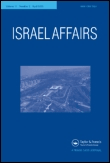
Israel Affairs
Unpacking the Rich Tapestry of Israeli StudiesIsrael Affairs is an esteemed academic journal published by Routledge Journals, Taylor & Francis Ltd, focusing on the multifaceted socio-political landscape of Israel and its dynamic relationships within the global context. Since its inception in 1994, the journal has become a crucial resource for scholars, practitioners, and students interested in cultural studies, history, and political science, evidenced by its commendable rankings in various categories—Q2 in Cultural Studies, Q1 in History, and Q3 in Political Science and International Relations. With an ISSN of 1353-7121 and an E-ISSN of 1743-9086, this journal encompasses a diverse range of topics addressing both historical and contemporary issues facing Israel, thus contributing to an informed discourse. Although it operates on a subscription basis, its rigorous peer-reviewed articles and comprehensive studies make it an invaluable asset for any library or research institution. The journal not only reflects the current trends in Israeli affairs but also sets the stage for future scholarship, aiming to enhance understanding and generate insightful dialogue among researchers and policy makers alike.
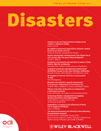
DISASTERS
Shaping the future of disaster studies with high-impact scholarship.DISASTERS, published by WILEY, is a premier academic journal dedicated to advancing the understanding of disasters across multiple disciplines, including Earth and Planetary Sciences and Social Sciences. With a historical publication span from 1977 to 2024, this journal has established itself as a vital resource within the academic community, boasting a Q1 category ranking in both fields, indicating its high impact and relevance. DISASTERS ranks impressively in Scopus, holding the #27 position in General Social Sciences and #36 in General Earth and Planetary Sciences, reflecting its influence in shaping disaster research and policy. The journal serves as a platform for interdisciplinary collaboration, offering researchers, professionals, and students critical insights into disaster management, response strategies, and risk reduction measures. Although it is not an Open Access journal, DISASTERS remains a cornerstone for those looking to contribute to and stay informed about the evolving landscape of disaster studies.
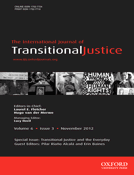
International Journal of Transitional Justice
Exploring the Pathways to JusticeThe International Journal of Transitional Justice, published by Oxford University Press, stands as a pivotal platform dedicated to exploring the complexities of transitional justice within the legal field. With an ISSN of 1752-7716 and an E-ISSN of 1752-7724, this esteemed journal has established itself as a leading resource for scholars and practitioners alike, particularly highlighted by its Q2 ranking in Law and a notable percentile rank in Scopus, placing it in the 89th percentile among social sciences journals. Launched in 2011 and committed to advancing discourse through rigorous academic research, the journal addresses fundamental themes such as human rights, accountability, and reconciliation processes in post-conflict societies. Although it does not currently offer open access, it provides insight and a critical examination of transitional justice mechanisms and their implications for legal frameworks worldwide, making it an essential read for researchers, professionals, and students seeking to deepen their understanding of this vital field. With converging years extending to 2024, the journal continues to evolve, fostering rich discussions that influence policy and academic thought.
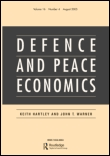
DEFENCE AND PEACE ECONOMICS
Exploring the Economics of Security and PeaceDEFENCE AND PEACE ECONOMICS, published by Taylor & Francis Ltd, stands as a vital interdisciplinary journal dedicated to the exploration of economic principles and policy frameworks within the context of defense and peace studies. With its ISSN 1024-2694 and E-ISSN 1476-8267, this esteemed journal has been contributing to the field since 1994, maintaining a reputation for rigorous academic research evidenced by its Q2 ranking in both Economics and Econometrics and Social Sciences (miscellaneous) categories for 2023. Positioned in the 84th percentile in Social Sciences and 68th percentile in Economics according to Scopus, it serves as a pivotal resource for researchers, policymakers, and educators alike. The journal aims to foster a deeper understanding of the economic dimensions of national security, conflict resolution, and peacebuilding, and it encourages submissions that address contemporary challenges and theoretical advancements in these fields. Although not an open-access journal, its insightful articles are accessible through institutional subscriptions, making them available to a wide audience. DEFENCE AND PEACE ECONOMICS continues to shape discourse and provide critical insights necessary for navigating the complexities of global security and economic interplay.
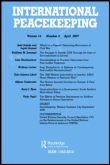
International Peacekeeping
Pioneering Research in Peacekeeping and Post-Conflict RecoveryInternational Peacekeeping is an esteemed journal published by Routledge Journals, Taylor & Francis Ltd, focusing on the interdisciplinary fields of political science and international relations. Established in 1994, the journal has become a leading platform for scholarly research and discourse on peacekeeping operations, conflict management, and post-conflict reconstruction. With an impressive Q1 category ranking and a percentile of 85 in Scopus rankings, it consistently publishes high-impact articles that shape contemporary understanding of peace and security issues. Although currently not open access, International Peacekeeping remains essential reading for researchers, professionals, and students seeking in-depth analyses and data-driven insights into global peace processes. Headquartered in the United Kingdom, the journal's rigorous peer-review process ensures that only the most impactful research is disseminated, underscoring its role as a cornerstone resource within the field.